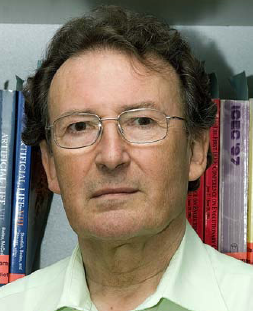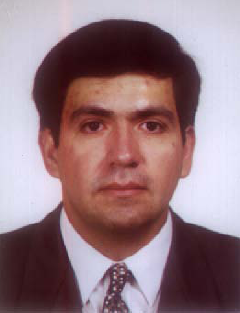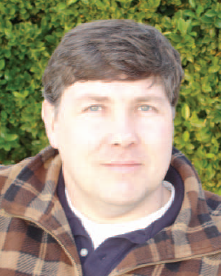
Awards
Best Paper Awards CEC 2011 |
|
Best Overall Paper
Comparison of Evolved Epidemic Networks with Diffusion Characters [#252] Best Student Papers
On the Limits of Effectiveness in Estimation of Distribution Algorithms [#148] |
Frank Rosenblatt Award to be Presented at CEC 2011 to Hans-Paul Schwefel
 The 2011 IEEE Frank Rosenblatt Award will be presented at CEC 2011 (www.cec2011.org) to Dr. Hans-Paul Schwefel, Professor Emeritus, Chair of Algorithm Engineering, Faculty of Computer Science, Dortmund University of Technology, Dortmund, Germany for pioneering contributions to evolutionary computation through the theory and application of evolution strategies. Schwefel is a German computer scientist and professor emeritus at Dortmund University of Technology, where he held the chair of systems analysis from 1985 until 2006. He is one of the pioneers in evolutionary computation and one of the authors responsible for the evolution strategies. His work has helped to understand the dynamics of evolutionary algorithms and to put evolutionary computation on formal grounds.
The 2011 IEEE Frank Rosenblatt Award will be presented at CEC 2011 (www.cec2011.org) to Dr. Hans-Paul Schwefel, Professor Emeritus, Chair of Algorithm Engineering, Faculty of Computer Science, Dortmund University of Technology, Dortmund, Germany for pioneering contributions to evolutionary computation through the theory and application of evolution strategies. Schwefel is a German computer scientist and professor emeritus at Dortmund University of Technology, where he held the chair of systems analysis from 1985 until 2006. He is one of the pioneers in evolutionary computation and one of the authors responsible for the evolution strategies. His work has helped to understand the dynamics of evolutionary algorithms and to put evolutionary computation on formal grounds.
Schwefel pioneered the collective self-adaptation of internal parameters within evolutionary algorithms, which helped to make such optimization methods not only effective, but also efficient. Later on he introduced a couple of evolutionary principles beyond variation and natural selection into the algorithms to handle special features of the search space. He published books and papers on theoretical as well as application aspects of evolutionary computation and disseminated his ideas worldwide by teaching lectures, seminars, tutorials, and organizing or co-organizing many conferences in the field. In 1990 he was co-founder of the international conference series on Parallel Problem Solving from Nature (PPSN), which has since been held biennially. He acted as dean of the faculty, as spokesman of the collaborative research center on computational intelligence (SFB 531), as co-founder and president of the Informatics Centre Dortmund (ICD), and also as pro-rector for research at the university. The University of Birmingham, U.K., admitted him the degree of Doctor of Science, honoris causa, in 2007.
 The IEEE Frank Rosenblatt Award was established in 2004 and is named in honor of Frank Rosenblatt, who is widely regarded as one of the founders of neural networks. Basing his research on study of fly vision, he developed the single-layer input layer and an output layer of neural cells. Frequent presentation of a pattern or patterns resulted in changes in the input to output connections, facilitating future recognition of these patterns, or memory. His work influenced and even anticipated many modern neural network approaches.
The IEEE Frank Rosenblatt Award was established in 2004 and is named in honor of Frank Rosenblatt, who is widely regarded as one of the founders of neural networks. Basing his research on study of fly vision, he developed the single-layer input layer and an output layer of neural cells. Frequent presentation of a pattern or patterns resulted in changes in the input to output connections, facilitating future recognition of these patterns, or memory. His work influenced and even anticipated many modern neural network approaches.
Recipient selection is administered through the Technical Field Awards Council of the IEEE Awards Board and sponsored by the IEEE Computational Intelligence Society. The award is for outstanding contribution(s) to the advancement of the design, practice, techniques, or theory in biologically and linguistically motivated computational paradigms, including but not limited to neural networks, connectionist systems, evolutionary computation, fuzzy systems, and hybrid intelligent systems in which these paradigms are contained.
The award consists of bronze medal, certificate and honorarium. In the evaluation process, the following criteria are considered: quality of contribution, impact on the technical field and society in general, publications or patents or other evidence, and the quality of the nomination. Previous awardees have been Michio Sugeno, John J. Hopfield, Teuvo Kohonen, James C. Bezdek and Lawrence J. Fogel. More information can be found at https://www.ieee.org/about/awards/tfas/rosenblatt.html.
Carlos A. Coello Coello to be Awarded IEEE Fellow at CEC 2011
 Carlos Artemio Coello Coello will receive the IEEE Fellow award at CEC 2011 (www.cec2011.org). Dr. Coello received a BSc in Civil Engineering from the Universidad Autonoma de Chiapas in Mexico in 1991 (graduating Summa Cum Laude). Then, he was awarded a scholarship from the Mexican government to pursue graduate studies in Computer Science at Tulane University (in the USA). He received a MSc and a PhD in Computer Science in 1993 and 1996, respectively. His PhD thesis was one of the first in the field now called "evolutionary multiobjective optimization". He pioneered the development of multi-objective optimization metaheuristics based on particle swarm optimization, artificial immune systems and micro genetic algorithms, as well as the design of constraint-handling techniques based on multi-objective optimization concepts.
Carlos Artemio Coello Coello will receive the IEEE Fellow award at CEC 2011 (www.cec2011.org). Dr. Coello received a BSc in Civil Engineering from the Universidad Autonoma de Chiapas in Mexico in 1991 (graduating Summa Cum Laude). Then, he was awarded a scholarship from the Mexican government to pursue graduate studies in Computer Science at Tulane University (in the USA). He received a MSc and a PhD in Computer Science in 1993 and 1996, respectively. His PhD thesis was one of the first in the field now called "evolutionary multiobjective optimization". He pioneered the development of multi-objective optimization metaheuristics based on particle swarm optimization, artificial immune systems and micro genetic algorithms, as well as the design of constraint-handling techniques based on multi-objective optimization concepts.
Dr. Coello has been a Senior Research Fellow in the Plymouth Engineering Design Centre (in England) and a Visiting Professor at DePauw University (in the USA). He is currently Professor and Chair of the Computer Science Department at CINVESTAV-IPN in Mexico City, Mexico.
He has published over 280 papers in international peer-reviewed journals, conferences and books. He has also co-authored the book Evolutionary Algorithms for Solving Multi-Objective Problems which is now in its second edition (Springer, New York, 2007) and has co-edited 3 books.
He currently serves as associate editor of nine international journals, including: IEEE Transactions on Evolutionary Computation, Evolutionary Computation, Journal of Heuristics, Soft Computing, Pattern Analysis and Applications, Memetic Computing and Computational Optimization and Applications. He also serves as a member of the editorial boards of six other international journals. He is member of the Mexican Academy of Science, the Association for Computing Machinery, the IEEE Computational Intelligence Society, and of Sigma Xi, The Scientific Research Society.
He received the 2007 National Research Award from the Mexican Academy of Science in the area of “exact sciences”. His publications currently reports over 4,800 citations (his h-index is 40).
He has been elevated to IEEE Fellow, effective 1 January 2011 “for contributions to multi-objective optimization and constraint-handling techniques”.
2011 CIS Evolutionary Computation Pioneer Award: Larry J. Eshelman
For contributions to genetic algorithm encoding, operators and the CHC algorithm development.
 Larry J. Eshelman is Principal Member of the Research Staff at Philips Research North America. He received his B.S. in Mathematics from Purdue University and his Ph.D. in Philosophy from the University of Waterloo in Ontario (dissertation topic in the area of artificial intelligence). He was on the research faculty of the Computer Science Department at Carnegie Mellon University from 1983–1988 before joining Philips Research in 1988. He became interested in genetic algorithms while at Carnegie Mellon, attending the first conference on genetic algorithms held there in 1985. At the conference he met J. David Schaffer and in 1988 joined Philips to work with Dr. Schaffer who was starting a genetic algorithm project. For the next 15 years he collaborated with Dr. Schaffer doing research on genetic algorithms, with a focus on developing novel crossover operators and applying genetic algorithms to industrial problems.
Larry J. Eshelman is Principal Member of the Research Staff at Philips Research North America. He received his B.S. in Mathematics from Purdue University and his Ph.D. in Philosophy from the University of Waterloo in Ontario (dissertation topic in the area of artificial intelligence). He was on the research faculty of the Computer Science Department at Carnegie Mellon University from 1983–1988 before joining Philips Research in 1988. He became interested in genetic algorithms while at Carnegie Mellon, attending the first conference on genetic algorithms held there in 1985. At the conference he met J. David Schaffer and in 1988 joined Philips to work with Dr. Schaffer who was starting a genetic algorithm project. For the next 15 years he collaborated with Dr. Schaffer doing research on genetic algorithms, with a focus on developing novel crossover operators and applying genetic algorithms to industrial problems.
During his first few years at Philips he developed the CHC genetic algorithm, which uses a number of mechanisms to get maximum power from crossover—the two most novel mechanisms being “incest prevention” and “soft-restarts.” These work in conjunction with cross-generational rank selection (similar to l 1 ? evolution strategy). Incest prevention is a self adjusting mechanism that prevents similar members of the population from being mated and all but eliminates genetic drift and significantly slows premature convergence. Soft-restarts replace mutation. The only operator used each generation to generate offspring is crossover. When the population has nearly converged, the best individual found is used as a template to generate a new population of partially randomized individuals, and the algorithm is restarted. Incest prevention and soft-restarts enable CHC to work well over a wide range of problems without the need for parameter tuning, and in particular, using the same population size. Easier problems are solved without a restart, whereas harder problems may require multiple restarts.
With David Schaffer, he developed one of the earliest commercially successful applications of genetic algorithms (an algorithm for configuring Philips’ pick-&-place machines for mounting surface mounted devices on printed circuit boards). Dr. Eshelman developed an indirect representation for the problem—genes coding for control parameters for phenotype-generating algorithms rather than the phenotype parameters directly. The success of this algorithm was in large part due to the use of an indirect representation and CHC’s robustness over a wide range of SMD-PCB problems using the same parameters. Dr. Eshelman and Dr. Schaffer received an “Extraordinary Technical Achievement Award” from Philips for this work.
For the last seven years Dr. Eshelman has focused his research in the healthcare application area. He heads a project at Philips Research that applies data mining and machine learning techniques to develop algorithms for assessing ICU patient criticality.
2011 CIS Meritorious Service Award: Patrick K. Simpson
For long time service to the computational intelligence community especially in the early days of the IEEE Neural Networks Council.
 Patrick K. Simpson’s IEEE involvement with neural networks started as the Lead Volunteer for the first International Conference on Neural Networks (ICNN 87). Simpson assumed larger roles with successive IEEE sponsored meetings, including Tutorials Chair (ICNN 88), Local Arrangements Chair (IJCNN 90), Finance Chair (FUZZIEEE 92), and Publicity Chair (ICEC 94). Simpson served as the Program Chair for the IEEE Conference on Neural Networks for Ocean Engineering and was General Chairman of the Second IEEE World Congress on Computational Intelligence held in Anchorage AK (WCCI 98). Simpson was appointed to the IEEE Neural Networks Council (NNC) by the IEEE Ocean Engineering Society in 1990 and was immediately elected Treasurer. Four years later, at the age of 28, Simpson served as the third President of the IEEE NNC. During Simpson’s year as President he made several substantial changes to the IEEE NNC in an effort to move toward becoming a society including: moving revenue from conferences to periodicals; reorganizing the council to include Vice President positions for Finance, Periodicals, and Conferences and adding the Past-President position; and working closely with the organization committee for the inaugural IEEE World Congress on Computational Intelligence (WCCI 94). During that same year he led unsuccessful efforts to merge the NNC with the IEEE Systems Man and Cybernetics Society and introduce a new journal entitled the IEEE Journal of Applied Computational Intelligence.
Patrick K. Simpson’s IEEE involvement with neural networks started as the Lead Volunteer for the first International Conference on Neural Networks (ICNN 87). Simpson assumed larger roles with successive IEEE sponsored meetings, including Tutorials Chair (ICNN 88), Local Arrangements Chair (IJCNN 90), Finance Chair (FUZZIEEE 92), and Publicity Chair (ICEC 94). Simpson served as the Program Chair for the IEEE Conference on Neural Networks for Ocean Engineering and was General Chairman of the Second IEEE World Congress on Computational Intelligence held in Anchorage AK (WCCI 98). Simpson was appointed to the IEEE Neural Networks Council (NNC) by the IEEE Ocean Engineering Society in 1990 and was immediately elected Treasurer. Four years later, at the age of 28, Simpson served as the third President of the IEEE NNC. During Simpson’s year as President he made several substantial changes to the IEEE NNC in an effort to move toward becoming a society including: moving revenue from conferences to periodicals; reorganizing the council to include Vice President positions for Finance, Periodicals, and Conferences and adding the Past-President position; and working closely with the organization committee for the inaugural IEEE World Congress on Computational Intelligence (WCCI 94). During that same year he led unsuccessful efforts to merge the NNC with the IEEE Systems Man and Cybernetics Society and introduce a new journal entitled the IEEE Journal of Applied Computational Intelligence.
Simpson’s 1990 book Artificial Neural Systems: Foundations, Paradigms, Applications, and Implementations was the first attempt to provide a consistent mathematical description of twenty-seven well-recognized neural networks and provide an exhaustive set of references for each paradigm. Simpson was Editor of a Special Issue on Neural Networks for IEEE Journal Ocean Engineering, he edited two books for the IEEE Technology Update Series entitled Neural Networks Theory, Technology and Applications, and he co-authored the book Computational Intelligence with Russel Eberhart and Roy Dobbins. Simpson has published several journal papers on neural networks and their synergism with fuzzy systems and evolutionary computation.
Simpson introduced Fuzzy Min-Max Neural Networks in 1990, showing that a hyperbox can be used to create classes and clusters and using these constructs to define fuzzy sets. Since their introduction, over 240 archival papers have been published that expanded, improved and applied this synergistic combination of neural networks and fuzzy systems.
Over the past fifteen years, Simpson has focused on entrepreneurial endeavors, founding companies that build sonar systems, unmanned underwater vehicles, and a variety of other marine products.
2011 IEEE Transactions on Evolutionary Computation Outstanding Paper Award: S. Y. Chong, P. Tino and X. Yao
For their paper entitled "Measuring Generalization Performance in Coevolutionary Learning," published in IEEE TEVC, vol. 12, no. 4, pp. 479-505, August 2008.
Digital Object Identifier: 10.1109/TEVC.2007.907593
Abstract— Coevolutionary learning involves a training process where training samples are instances of solutions that interact strategically to guide the evolutionary (learning) process. One main research issue is with the generalization performance, i.e., the search for solutions (e.g., input-output mappings) that best predict the required output for any new input that has not been seen during the evolutionary process. However, there is currently no such framework for determining the generalization performance in coevolutionary learning even though the notion of generalization is well-understood in machine learning. In this paper, we introduce a theoretical framework to address this research issue. We present the framework in terms of game-playing although our results are more general. Here, a strategy’s generalization performance is its average performance against all test strategies. Given that the true value may not be determined by solving analytically a closed-form formula and is computationally prohibitive, we propose an estimation procedure that computes the average performance against a small sample of random test strategies instead. We perform a mathematical analysis to provide a statistical claim on the accuracy of our estimation procedure, which can be further improved by performing a second estimation on the variance of the random variable. For game-playing, it is well-known that one is more interested in the generalization performance against a biased and diverse sample of “good” test strategies. We introduce a simple approach to obtain such a test sample through the multiple partial enumerative search of the strategy space that does not require human expertise and is generally applicable to a wide range of domains. We illustrate the generalization framework on the coevolutionary learning of the iterated prisoner’s dilemma (IPD) games. We investigate two definitions of generalization performance for the IPD game based on different performance criteria, e.g., in—terms of the number of wins based on individual outcomes and in terms of average payoff. We show that a small sample of test strategies can be used to estimate the generalization performance. We also show that the generalization performance using a biased and diverse set of “good” test strategies is lower compared to the unbiased case for the IPD game. This is the first time that generalization is defined and analyzed rigorously in coevolutionary learning. The framework allows the evaluation of the generalization performance of any coevolutionary learning system quantitatively.
2011 CIS Outstanding Organization Award: Natural Selection, Inc
 Natural Selection, Inc. (NSI), based in San Diego, California, was founded in 1993 by Dr. Lawrence J. Fogel, Dr. David B. Fogel, and Mrs. Eva Fogel. In its 17-year history, the company has applied computational intelligence methods to diverse problems in defense, homeland security, industry, and medicine. Daily operations for the company are now handled by Dr. Gary Fogel, CEO, and Mr. Bill Porto, President. NSI has supported literally hundreds of clients during its lifespan, but is perhaps best known for its successes in evolving conformations for new drug leads for Agouron Pharmaceuticals in the 1990s, and more recently for its work in support of numerous defense and biotechnology projects for government agencies, such as DARPA, and private industry, including Eli Lilly & Co. The company has pioneered groundbreaking research in pattern identification over large dynamic databases through the efforts of Mr. Bill Porto. Through self-funded research, NSI has also contributed substantially to the advancement of theory and practice of computational intelligence, including the game playing programs Blondie24 and Blondie25 for checkers and chess, respectively, that evolved neural networks to learn game strategies with very little preprogrammed human expertise. NSI personnel have played key roles in the development of the evolutionary computation and neural networks communities. Some of these foundational efforts including creating the IEEE Transactions on Evolutionary Computation (founding editor-in chief, David Fogel) and the IEEE Symposium on Computational Intelligence in Bioinformatics and Computational Biology (founding general chair, Gary Fogel), as well as foundational works in multiobjective optimization using Dr. Larry Fogel’s Valuated State Space Approach. NSI’s personnel have received two IEEE Technical Field Awards, two IEEE CIS Pioneer Awards, and other notable recognitions. The staff has more than 100 years combined experience in computational intelligence, including near five decades of experience contributed by Dr. George Burgin, a contemporary pioneer of Larry Fogel. NSI continues to advance the state-of-the-art in computational intelligence, applying a broad range of bio-inspired problem-solving techniques to challenging problems.
Natural Selection, Inc. (NSI), based in San Diego, California, was founded in 1993 by Dr. Lawrence J. Fogel, Dr. David B. Fogel, and Mrs. Eva Fogel. In its 17-year history, the company has applied computational intelligence methods to diverse problems in defense, homeland security, industry, and medicine. Daily operations for the company are now handled by Dr. Gary Fogel, CEO, and Mr. Bill Porto, President. NSI has supported literally hundreds of clients during its lifespan, but is perhaps best known for its successes in evolving conformations for new drug leads for Agouron Pharmaceuticals in the 1990s, and more recently for its work in support of numerous defense and biotechnology projects for government agencies, such as DARPA, and private industry, including Eli Lilly & Co. The company has pioneered groundbreaking research in pattern identification over large dynamic databases through the efforts of Mr. Bill Porto. Through self-funded research, NSI has also contributed substantially to the advancement of theory and practice of computational intelligence, including the game playing programs Blondie24 and Blondie25 for checkers and chess, respectively, that evolved neural networks to learn game strategies with very little preprogrammed human expertise. NSI personnel have played key roles in the development of the evolutionary computation and neural networks communities. Some of these foundational efforts including creating the IEEE Transactions on Evolutionary Computation (founding editor-in chief, David Fogel) and the IEEE Symposium on Computational Intelligence in Bioinformatics and Computational Biology (founding general chair, Gary Fogel), as well as foundational works in multiobjective optimization using Dr. Larry Fogel’s Valuated State Space Approach. NSI’s personnel have received two IEEE Technical Field Awards, two IEEE CIS Pioneer Awards, and other notable recognitions. The staff has more than 100 years combined experience in computational intelligence, including near five decades of experience contributed by Dr. George Burgin, a contemporary pioneer of Larry Fogel. NSI continues to advance the state-of-the-art in computational intelligence, applying a broad range of bio-inspired problem-solving techniques to challenging problems.